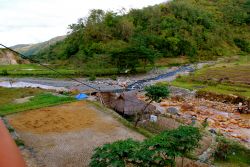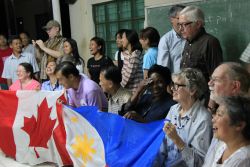Philippine Mining Climate: Canada Connection
BLOG POST posted on Février 23, 2012 by JR Guerrero
PHILIPPINE MINING CLIMATE: The Canada Connection
February 2012. MANILA, Philippines. – The defeat in parliament of private members Bill C-300 on Corporate Accountability on Mining, Oil, & Gas Exploration in Developing Countries, coupled with Philippine President Noynoy Aquino’s aggressive position in luring foreign mining investments in the country amidst a growing worldwide resistance against unethical exploitation of natural resources in developing nations, grip Filipinos with suspense as to what would come out of the current national discourse on mining.
From north to south, Indigenous people of the Cordilleras, the Igorots, all the way to Lumad territories in Mindanao have for over 15 years been struggling to keep their ancestral lands protected from destructive mining operations by mostly foreign transnational mining corporations. In tandem with the Philippine army and its notorious paramilitary groups, the mining environment has been replete with human rights violations, killings, disappearances, community dislocation, inequitable distribution of profits, government corruption, & environmental disasters.
This mining climate prompted the United Church of Canada (UCC) through its Beaconsfield Congregation in Montreal to launch the so-called Beaconsfield Initiative, a 14-person exposure trip to the Cordilleras of Northern Luzon Philippines that evaluated Canadian mining impact in the region. Religious and lay delegates coming from New Brunswick, Toronto, Montreal, Alberta, and British Columbia participated in the 10-day mission that visited communities in the Abra, Benguet, and Ilocos Sur regions. Meetings with local and provincial politicians including Governor Bersamin of Abra, Governor Fongwan of Benguet, Mayor Maggay of Cervantes, and Mayor Luspian of Mankayan were held to confirm reported violations and to provide them current findings. Community immersion trips were conducted in the remote villages of Sallapadan and Tubo to check in on current exploration applications by mining firms CANEX and ADANACEX, subsidiaries of Canadian giants Solfotara and Metallum. Separate consultations were also held with Ricardo Paras III Chief State Council of the Department of Justice and with the Canadian Ambassador to the Philippines Chris Thornley.
Against the backdrop of environmental disasters and controversial mining impacts by Canadian companies operating in the Philippines (Placer Dome now Barrick Gold that left Marinduque island with a dead ecosystem), Ambassador Thornley explained to the delegation that there is only one Canadian mining company currently operating in the Philippines, namely Toronto Ventures Incorporated (TVI). However, records provided by the Cordillera People’s Alliance (CPA) to the Beaconsfield delegates reveal that there are at least seven Canadian firms present in the Cordillera Region alone (Metallum, Solfotara, Canex, Olympus, Pacific Metals Canada Philippines, Adancex, & Columbus/Magellan) hidden in local subsidiaries. TVI, the same company that in 2008 terminated its Siocon mining site in Zamboanga Del Norte, much like most foreign mining firms operating in the Philippines, repatriated 100 percent of its profits to Canada without investing in the country and left the Lumads of the territory (Subanon) a legacy of broken promises; destruction of a sacred mountain, dislocation & polarization of communities, and unfulfilled social and livelihood development and infrastructure commitments.
Such are some of the impacts experienced in the Philippines through an investor-friendly and anti-Filipino 1995 Mining Act. On the occasion of the Act’s 17th anniversary, Kalikasan PNE, the Center for Environmental Concerns Philippines, and the Ecumenical Bishops Forum lead this year’s 3rd People’s Mining Conference with aims of providing a true Filipino-centred mining policy and heightening people’s struggle for land, life, and environment. The conference will be held between February 29 – March 2, 2012 in Sta. Rita, Tagaytay City. The Conference culminates with a candle vigil and mass action protest in the nation’s capital, Manila.
The site for the Vancouver local of The Media Co-op has been archived and will no longer be updated. Please visit the main Media Co-op website to learn more about the organization.

